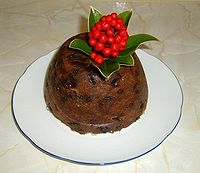
Stir-up Sunday
Encyclopedia

Advent
Advent is a season observed in many Western Christian churches, a time of expectant waiting and preparation for the celebration of the Nativity of Jesus at Christmas. It is the beginning of the Western liturgical year and commences on Advent Sunday, called Levavi...
.
The term comes from the opening words of the collect
Collect
In Christian liturgy, a collect is both a liturgical action and a short, general prayer. In the Middle Ages, the prayer was referred to in Latin as collectio, but in the more ancient sources, as oratio. In English, and in this usage, "collect" is pronounced with the stress on the first syllable...
for the day in the Book of Common Prayer
Book of Common Prayer
The Book of Common Prayer is the short title of a number of related prayer books used in the Anglican Communion, as well as by the Continuing Anglican, "Anglican realignment" and other Anglican churches. The original book, published in 1549 , in the reign of Edward VI, was a product of the English...
of 1549 and later (a translation of the Roman Missal
Roman Missal
The Roman Missal is the liturgical book that contains the texts and rubrics for the celebration of the Mass in the Roman Rite of the Catholic Church.-Situation before the Council of Trent:...
's collect "Excita, quæsumus"):
- Stir up, we beseech thee, O Lord, the wills of thy faithful people; that they, plenteously bringing forth the fruit of good works, may of thee be plenteously rewarded; through Jesus Christ our Lord. Amen.
In the Book of Common Prayer
Book of Common Prayer
The Book of Common Prayer is the short title of a number of related prayer books used in the Anglican Communion, as well as by the Continuing Anglican, "Anglican realignment" and other Anglican churches. The original book, published in 1549 , in the reign of Edward VI, was a product of the English...
of 1662 and later, this collect is listed for "The Twenty-Fifth Sunday After Trinity", with a rubric specifying that this collect "shall always be used upon the Sunday next before Advent". This reinforced the significance of this day as forming part of the preparation for the season of Advent. The rubric is necessary because the last Sunday before Advent does not always fall on the twenty-fifth Sunday after Trinity: Trinity Sunday
Trinity Sunday
Trinity Sunday is the first Sunday after Pentecost in the Western Christian liturgical calendar, and the Sunday of Pentecost in Eastern Christianity...
is a moveable feast
Moveable feast
In Christianity, a moveable feast or movable feast is a holy day – a feast day or a fast day – whose date is not fixed to a particular day of the calendar year but moves in response to the date of Easter, the date of which varies according to a complex formula...
and the Advent
Advent
Advent is a season observed in many Western Christian churches, a time of expectant waiting and preparation for the celebration of the Nativity of Jesus at Christmas. It is the beginning of the Western liturgical year and commences on Advent Sunday, called Levavi...
season is fixed, so the number of weeks in between varies from year to year.
Thus, this collect always was read just before Advent. Since most recipes for Christmas pudding call for the mixture to stand for several weeks before cooking, the day subsequently became connected, in countries which used the Book of Common Prayer
Book of Common Prayer
The Book of Common Prayer is the short title of a number of related prayer books used in the Anglican Communion, as well as by the Continuing Anglican, "Anglican realignment" and other Anglican churches. The original book, published in 1549 , in the reign of Edward VI, was a product of the English...
, with the preparation of Christmas pudding
Christmas pudding
Christmas pudding is a pudding traditionally served on Christmas Day . It has its origins in medieval England, and is sometimes known as plum pudding or plum duff, though this can also refer to other kinds of boiled pudding involving dried fruit.-Basics:Many households have their own recipe for...
s in readiness for Christmas
Christmas
Christmas or Christmas Day is an annual holiday generally celebrated on December 25 by billions of people around the world. It is a Christian feast that commemorates the birth of Jesus Christ, liturgically closing the Advent season and initiating the season of Christmastide, which lasts twelve days...
.. Supposedly, cooks, wives and their servants would go to church, hear the words 'Stir up, we beseech thee, O Lord...', and be reminded, by association of ideas, that it was about time to start stirring up the puddings for Christmas.
In recent years most provinces of the Anglican Communion
Anglican Communion
The Anglican Communion is an international association of national and regional Anglican churches in full communion with the Church of England and specifically with its principal primate, the Archbishop of Canterbury...
have adopted the practice of the Roman Catholic Church
Roman Catholic Church
The Catholic Church, also known as the Roman Catholic Church, is the world's largest Christian church, with over a billion members. Led by the Pope, it defines its mission as spreading the gospel of Jesus Christ, administering the sacraments and exercising charity...
in observing this Sunday as Christ the King
Feast of Christ the King
The Feast of Christ the King is the last holy Sunday in the western liturgical calendar, celebrated by the Roman Catholic Church as well as many Anglicans, Lutherans, and other Mainline Protestants.-Origin and history in the Catholic Church:Pope Pius XI instituted the Feast of Christ the...
(sometimes under the name The Reign of Christ). Popular attachment to the Stir up collect has, however, caused it to be retained (in contemporary language) in the liturgies of several provinces. The Church of England
Church of England
The Church of England is the officially established Christian church in England and the Mother Church of the worldwide Anglican Communion. The church considers itself within the tradition of Western Christianity and dates its formal establishment principally to the mission to England by St...
's Common Worship
Common Worship
Common Worship is the name given to the series of services authorised by the General Synod of the Church of England and launched on the first Sunday of Advent in 2000. It represents the most recent stage of development of the Liturgical Movement within the Church and is the successor to the...
uses it as the Post-Communion prayer, with a rubric stating that it "may be used as the Collect at Morning and Evening Prayer during this week".
In the Episcopal Church, USA, the collect appointed for the Third Sunday of Advent in the Book of Common Prayer (1979) begins with the phrase "stir up your power O Lord." Thus, in many Episcopal Churches, the Third Sunday of Advent, also known as Gaudete (rejoice) Sunday, is referred to as "stir-up Sunday." Marion J. Hatchett
Marion J. Hatchett
Marion Josiah Hatchett was an Episcopal priest, scholar, and one of the primary liturgists who shaped 1979 Book of Common Prayer.Born in Monroe, South Carolina, Hatchett was the son of a United Methodist minister. In December 1946 he was confirmed as an Episcopalian while a student at Wofford...
in his definitive work Commentary on the American Prayer Book, notes that in the Pre-Reformation English Sarum Rite, collects for four of the last five Sundays before Christmas began with the word excita or "stir up." A similar collect to the one appointed in the BCP 1979 appears in the recent book authorized for use in the Church of England, Common Worship, appointed for the Second Sunday of Advent, but the phrase "raise up" is used instead.

